Startups - the spirit of the time
- Transfer
When you peer at the offers coming to the venture company Y Combinator, it seems that you are peering into the crystal ball of the future.
Twice a year - in winter and spring - thousands of people turn to the Y Combinator venture firm with their suggestions. “Each of these bright minds has their own vision of the future of technology. They give out ideas related to bitcoin, drones, new drugs, virtual reality and almost all other topics that you can only imagine.
Since 2008, we have received tens of thousands of such offers. All of them together allow you to feel the ideas that energetic and intelligent people are working on and how all this changes over time. We have never spoken about them publicly before.
But recently, we commissioned Priceonomics (YC W12) to analyze our data on proposals (without reference to the authors) for eight years. After analyzing the keyword suggestions, they calculated the percentage of applicants who mentioned a particular term.
Consider this data, starting with a simple example.
Y Combinator has questions for applicants: “Who are your competitors? Who are you most afraid of? ” Analyzing the answers to this question, we can see what the founders of the companies think.
Goliaths in the world of information technology
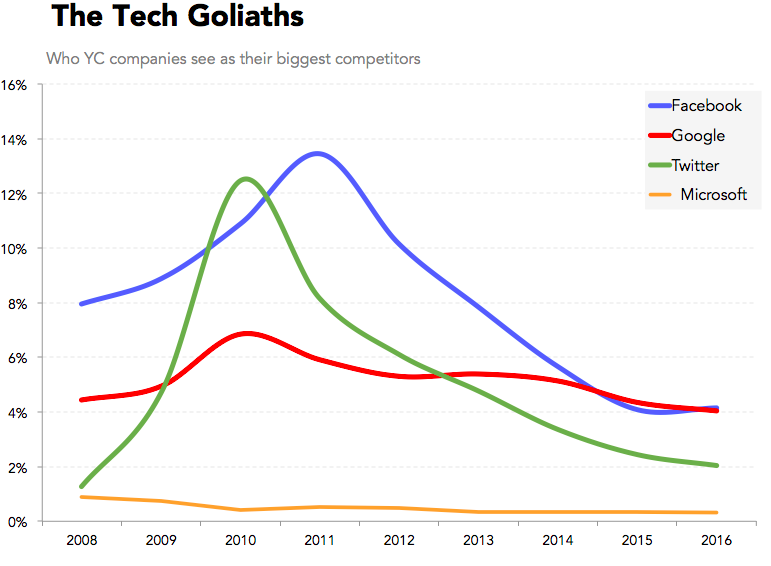
When Twitter appeared and - after the launch of the new version of this site in 2010 - began to grow rapidly, there were many startups making Twitter-like applications and tools for Twitter users who, respectively, were worried that Twitter could compete with them. Very few applicants mention Microsoft - Paul Graham recently wrote why this might be.
Some startups are already included in the same top list of competitors. Uber and Airbnb gain about half of Google’s mentions.
Competitors for startups
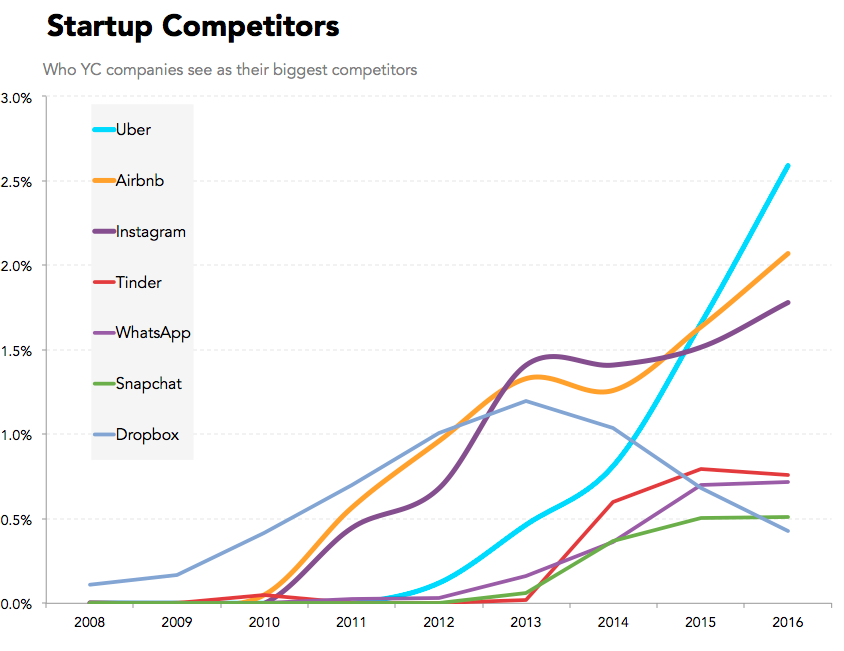
Other companies are completely out of the list. Do you still remember MySpace?
Fallen giants
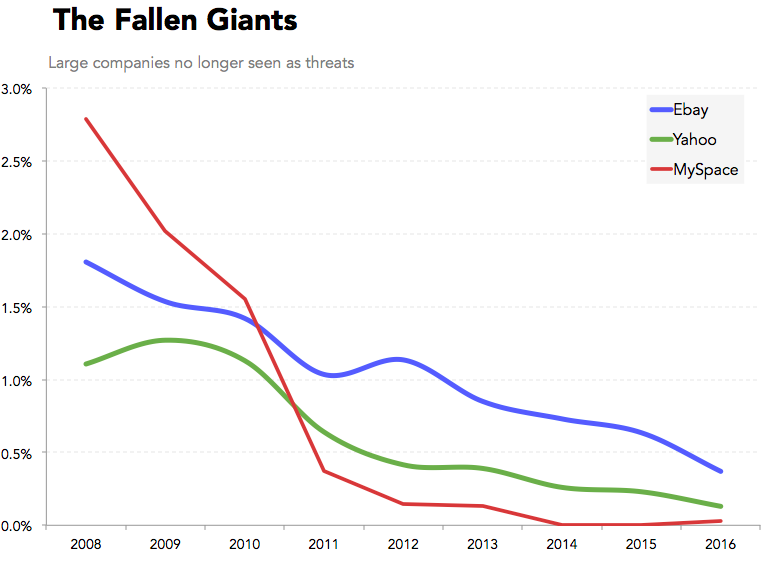
The rest of these graphs are based on the answer to the question: “What is your company going to do?” Let's see what this has to say about the shift in position from websites to applications.
Comparison of websites with applications
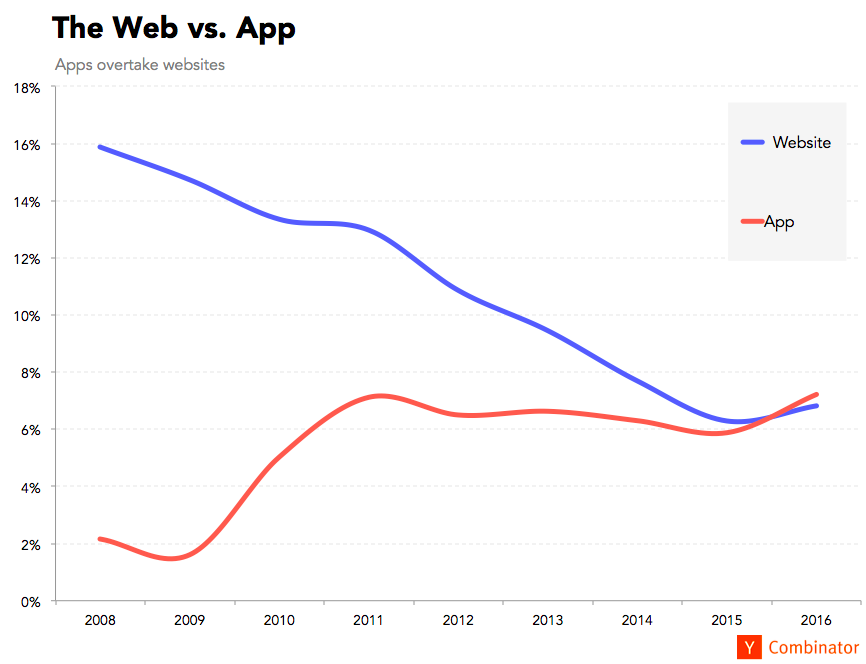
While the trend in this graph is not news, it was unexpected that applications were able to catch up with websites in 2016.
Among mobile devices, the iPad was especially often mentioned after its first appearance. Now he is rarely mentioned - probably not because people no longer make applications for the iPad, but just now it is so obvious that support for the iPad will be provided that you don’t need to remember that. Interest in this regard to the Kindle has never been very strong.
Tablets and e-books
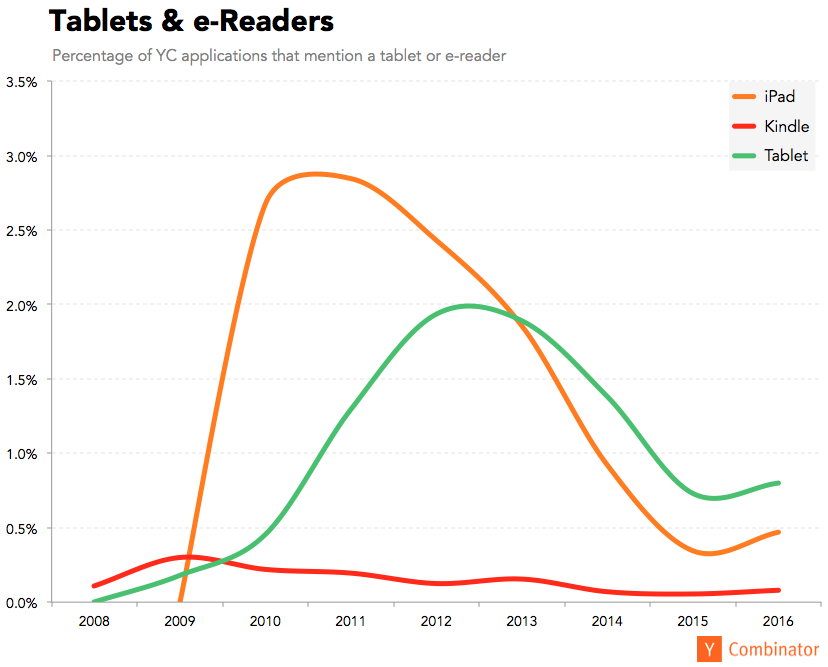
In the first years after the emergence of Y Combinator, applicants often indicated free and ad-supported business models. Gradually, in the startup world, this business model has become less common; it has been replaced by companies paid directly by customers. We always expected such a situation, which can be seen on this chart.
Saas companies in comparison with companies supported by advertising.
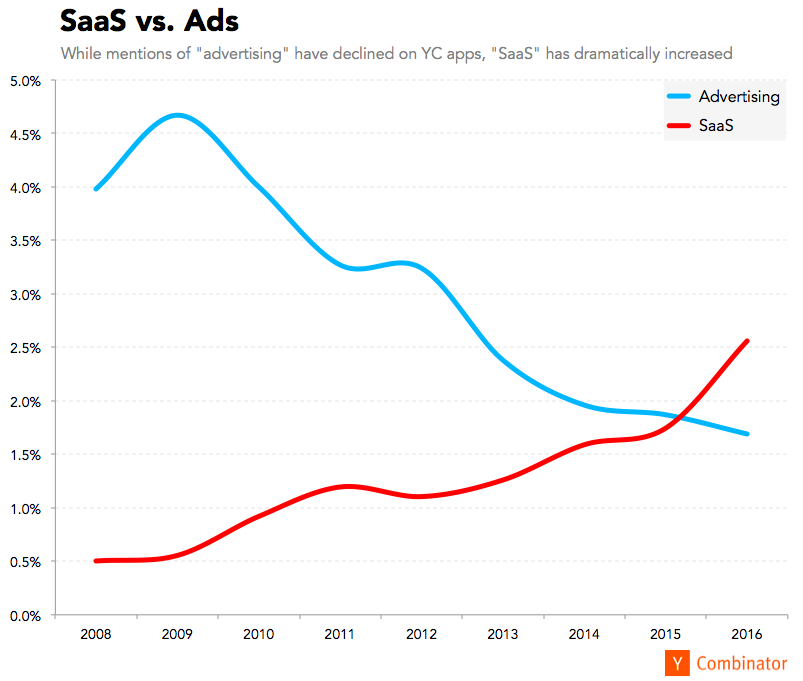
Pointing to “SaaS” (“Software as a Service” or, in other words, people pay for it) has grown 4 times since 2008 , while the mention of "advertising" companies decreased by more than 60%.
Startups were related to blogging, which was very fashionable - many applicants offered tools, the best sites for bloggers or search engines for blogs. This direction is now unpopular.
Decreased interest in blogs.
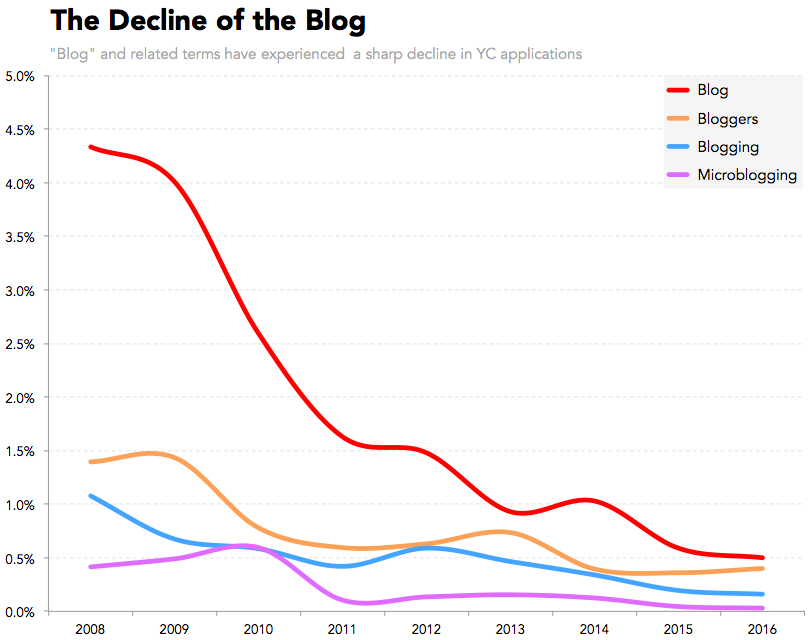
There are still many ideas aimed at improving or eliminating email, but not as much as before. Messengers are now becoming increasingly popular.
Messaging and Communication
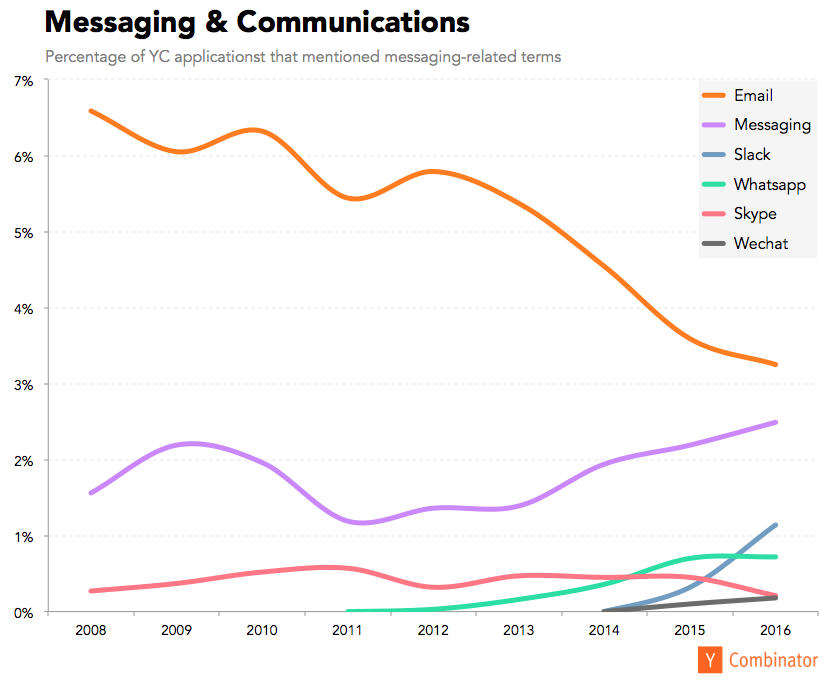
In the depths of the above graph, Slack is a rapidly growing messaging service.
Let's take a closer look at the rise of Slack, comparing it with the number of applications mentioning other popular GitHub and Docker services:
Slack: a leader among enterprise tools
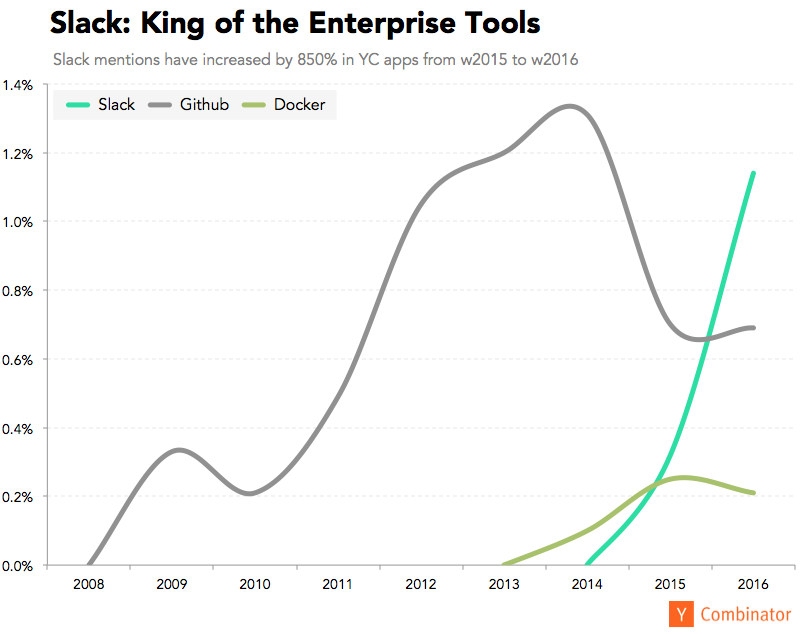
Many startups believe that Slack has created an unrivaled distribution opportunity. Interest in concepts related to Slack, mainly bots and concierge management, began to grow explosively last year.
Now let's see what happened to Bitcoin in these years.
Digital currencies and technology
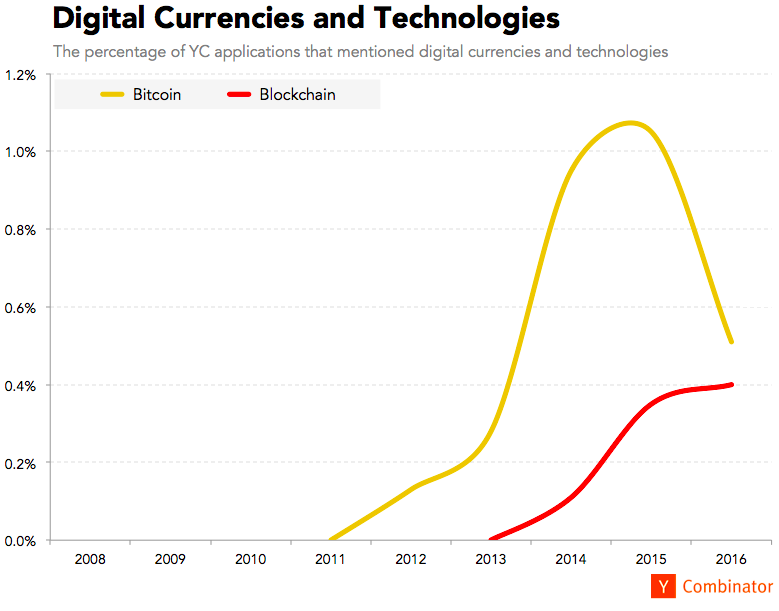
Bitcoin-related ideas have been extremely popular for some time, but interest in them has quickly fallen. Currently, the creation of add-ons on the blockchain is growing and, it seems, can surpass Bitcoin itself.
Hardware and biotechnology are gaining in popularity. This is partly due to a change in the content of startups reviewed by Y Combinator. Initially, Y Combinator was focused on software companies, but in recent years has extended its funding to all areas. This has been reflected in the rapidly growing interest in hardware and biotechnology now that lab work has become much more accessible to startups.
Growing interest in hardware
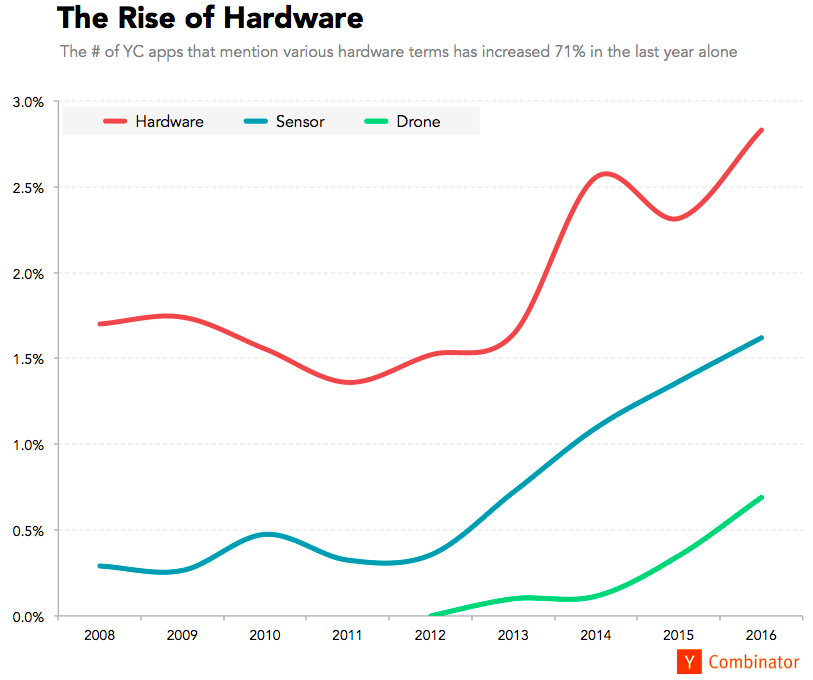
Biotechnology and pharmaceuticals
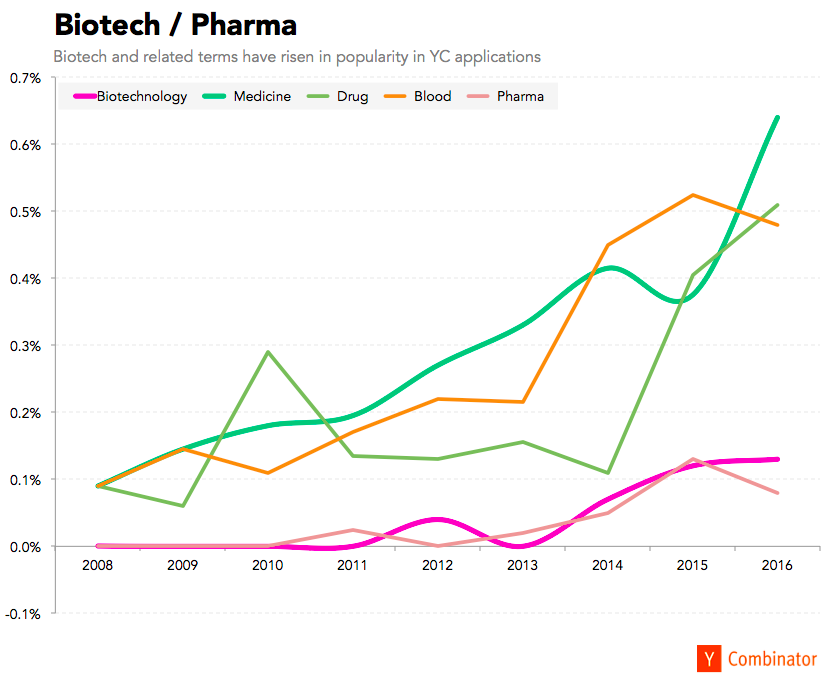
Smartphones, smart watches and other wearable devices remain popular among hardware, although interest in them has now stabilized.
Smart Devices and Wearable Accessories
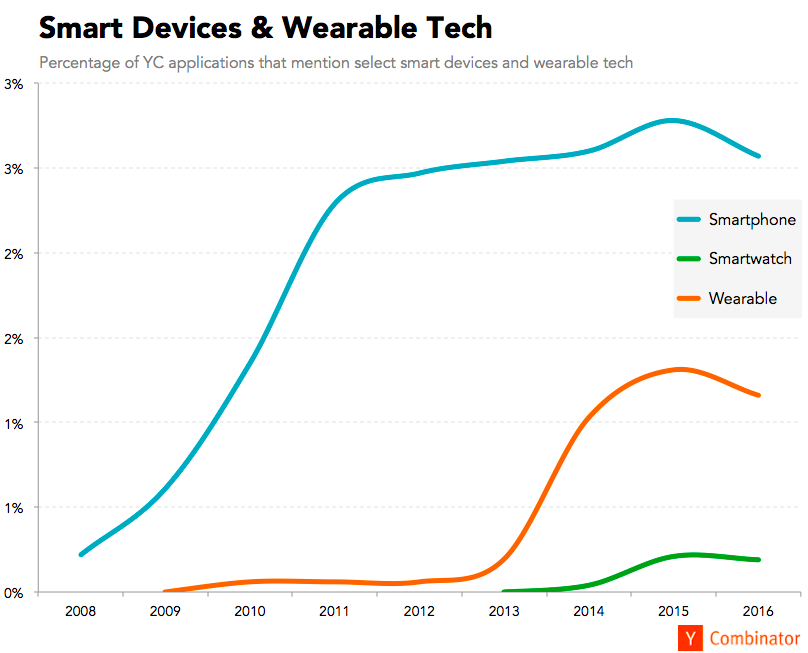
Other representatives of the hardware could not resist. Mentioning tablets and e-books has declined sharply in offers for Y Combinator in recent years.
Tablets and e-books The
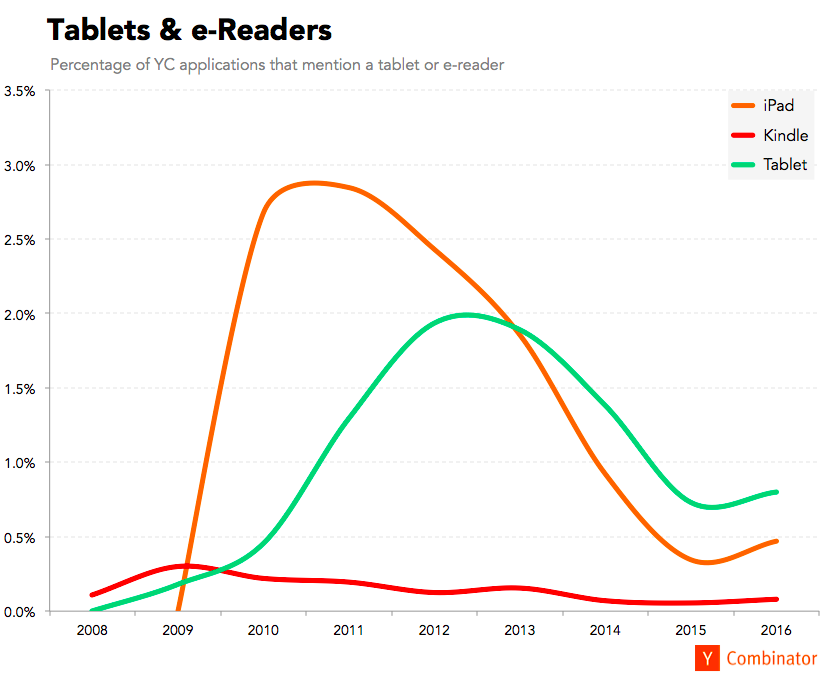
interest in virtual reality (VR) is great and continues to grow, which is not surprising. We recently tweeted a request for VR apps and got a great response.
Virtual and Augmented Reality
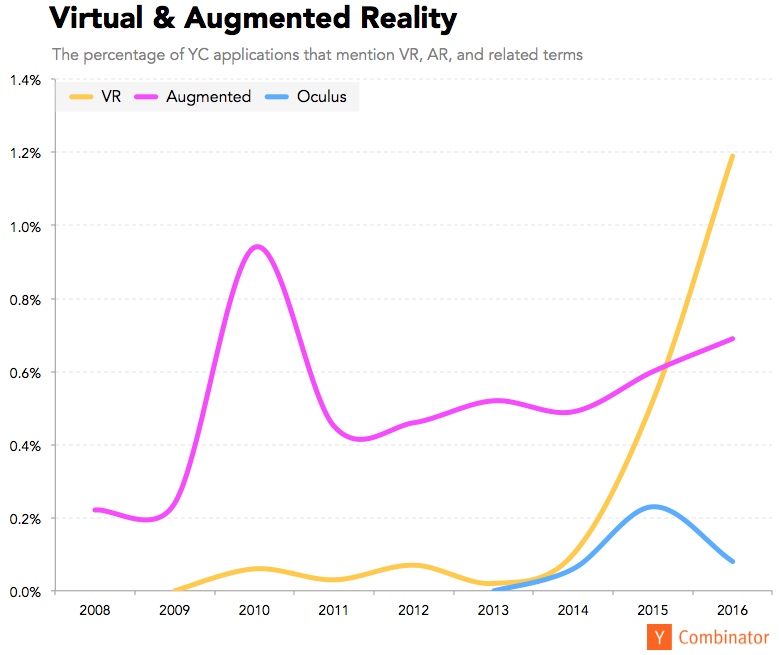
But the biggest trend in the last couple of years has been manifested in a surge in interest in the use of artificial intelligence in everything. Even these graphs do not fully show the importance that artificial intelligence now has in the ideas of many companies.
Artificial Intelligence
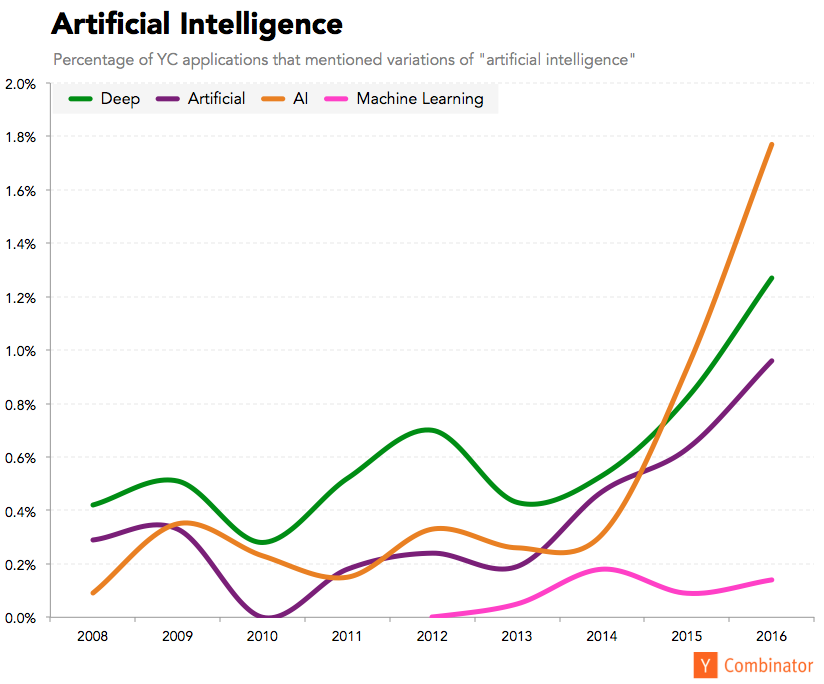
In conclusion, we have collected many of the most popular items mentioned in this article in one table, where they can be compared with each other. The positions in the list are ranked by the relative share of their references in the sentences. All named companies are highlighted in orange.
List of the most popular positions from the offers to the Y Combinator venture company in 2016.
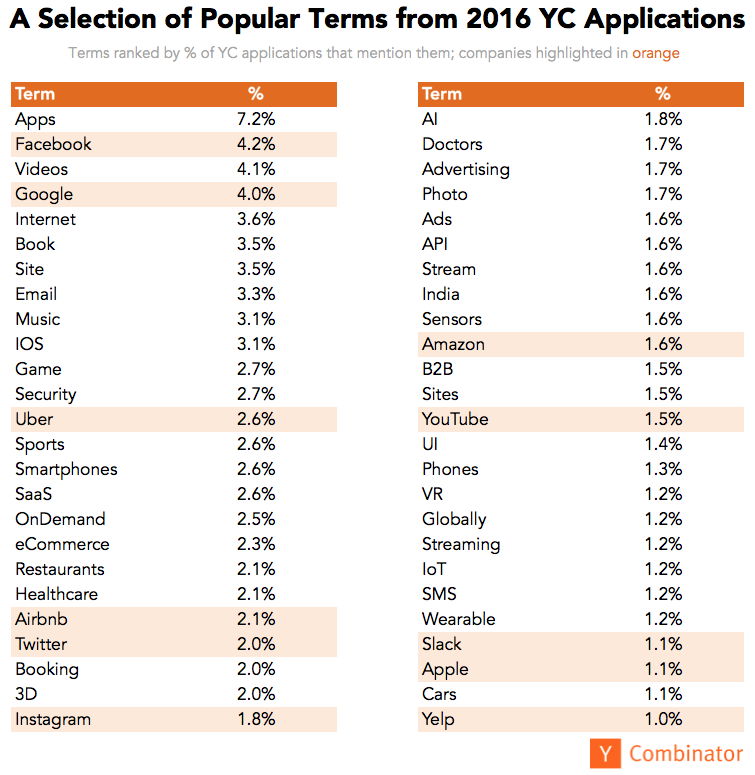
Despite the decrease in interest in them, Facebook (4.2%) and Google (4%) remain, nevertheless, the most mentioned companies in requests to the “Y Combinator” ". Beginners are growing fast - Uber (2.6%), Airbnb (2.1%) and Slack (1.1%).
This table does not show which positions are growing and which are going down. Therefore, we have identified technologies and companies to which our applicants are losing interest, as well as those to which this interest is growing rapidly. We limited this list to the positions mentioned in at least 0.5% of all applications in 2016 (rounded to tenths of a percent).
The positions that lost the applicants' interest to the greatest extent from 2015 to 2016.
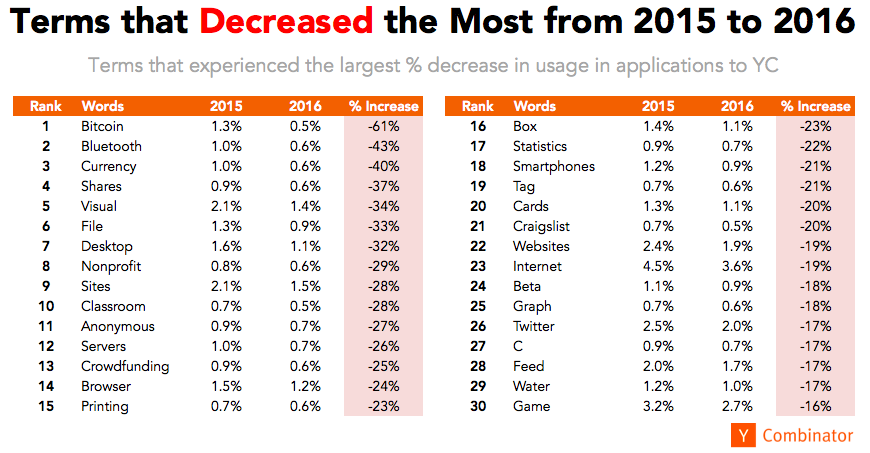
As you can see, the position of Bitcoin did not hold in the references to applications in Y Combinator in the last year - a decrease of 61%. It should also be noted that Bluetooth, crowdfunding and Websites showed a similar decline.
Of all the positions included in this article, one completely surpassed all the others in popularity - this is Slack. Over the past year, the mention of this company in applications in Y Combinator has grown by 850%.
Positions for which applicants are most interested in from 2015 to 2016.
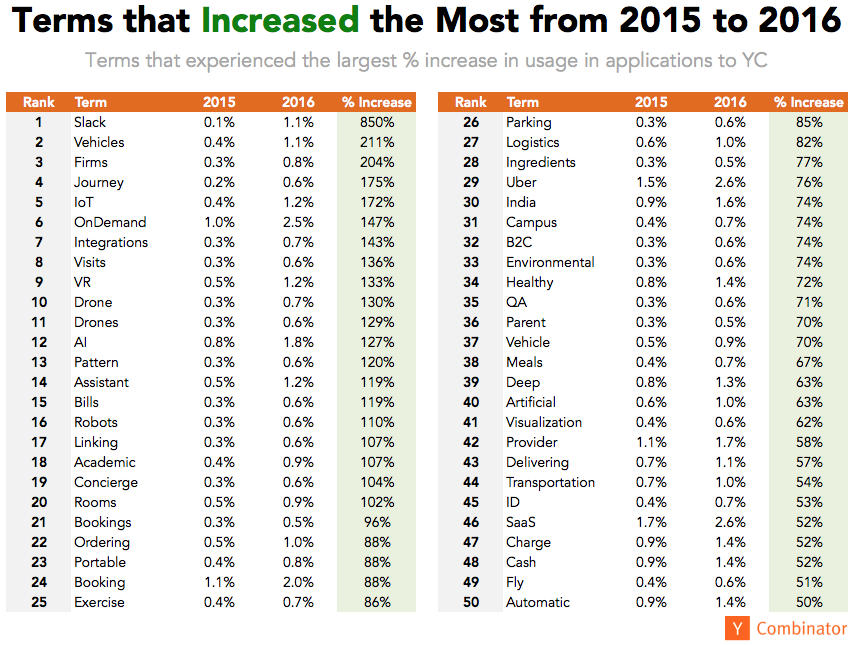
We believe that these data are quite interesting, and we plan to track them more closely. If you have other opinions on the interpretation of this data or have ideas on issues that we can consider, we are waiting for your comments.
Twice a year - in winter and spring - thousands of people turn to the Y Combinator venture firm with their suggestions. “Each of these bright minds has their own vision of the future of technology. They give out ideas related to bitcoin, drones, new drugs, virtual reality and almost all other topics that you can only imagine.
Since 2008, we have received tens of thousands of such offers. All of them together allow you to feel the ideas that energetic and intelligent people are working on and how all this changes over time. We have never spoken about them publicly before.
But recently, we commissioned Priceonomics (YC W12) to analyze our data on proposals (without reference to the authors) for eight years. After analyzing the keyword suggestions, they calculated the percentage of applicants who mentioned a particular term.
Consider this data, starting with a simple example.
Y Combinator has questions for applicants: “Who are your competitors? Who are you most afraid of? ” Analyzing the answers to this question, we can see what the founders of the companies think.
Goliaths in the world of information technology

When Twitter appeared and - after the launch of the new version of this site in 2010 - began to grow rapidly, there were many startups making Twitter-like applications and tools for Twitter users who, respectively, were worried that Twitter could compete with them. Very few applicants mention Microsoft - Paul Graham recently wrote why this might be.
Some startups are already included in the same top list of competitors. Uber and Airbnb gain about half of Google’s mentions.
Competitors for startups

Other companies are completely out of the list. Do you still remember MySpace?
Fallen giants

The rest of these graphs are based on the answer to the question: “What is your company going to do?” Let's see what this has to say about the shift in position from websites to applications.
Comparison of websites with applications

While the trend in this graph is not news, it was unexpected that applications were able to catch up with websites in 2016.
Among mobile devices, the iPad was especially often mentioned after its first appearance. Now he is rarely mentioned - probably not because people no longer make applications for the iPad, but just now it is so obvious that support for the iPad will be provided that you don’t need to remember that. Interest in this regard to the Kindle has never been very strong.
Tablets and e-books

In the first years after the emergence of Y Combinator, applicants often indicated free and ad-supported business models. Gradually, in the startup world, this business model has become less common; it has been replaced by companies paid directly by customers. We always expected such a situation, which can be seen on this chart.
Saas companies in comparison with companies supported by advertising.

Pointing to “SaaS” (“Software as a Service” or, in other words, people pay for it) has grown 4 times since 2008 , while the mention of "advertising" companies decreased by more than 60%.
Startups were related to blogging, which was very fashionable - many applicants offered tools, the best sites for bloggers or search engines for blogs. This direction is now unpopular.
Decreased interest in blogs.

There are still many ideas aimed at improving or eliminating email, but not as much as before. Messengers are now becoming increasingly popular.
Messaging and Communication

In the depths of the above graph, Slack is a rapidly growing messaging service.
Let's take a closer look at the rise of Slack, comparing it with the number of applications mentioning other popular GitHub and Docker services:
Slack: a leader among enterprise tools

Many startups believe that Slack has created an unrivaled distribution opportunity. Interest in concepts related to Slack, mainly bots and concierge management, began to grow explosively last year.
Now let's see what happened to Bitcoin in these years.
Digital currencies and technology

Bitcoin-related ideas have been extremely popular for some time, but interest in them has quickly fallen. Currently, the creation of add-ons on the blockchain is growing and, it seems, can surpass Bitcoin itself.
Hardware and biotechnology are gaining in popularity. This is partly due to a change in the content of startups reviewed by Y Combinator. Initially, Y Combinator was focused on software companies, but in recent years has extended its funding to all areas. This has been reflected in the rapidly growing interest in hardware and biotechnology now that lab work has become much more accessible to startups.
Growing interest in hardware

Biotechnology and pharmaceuticals

Smartphones, smart watches and other wearable devices remain popular among hardware, although interest in them has now stabilized.
Smart Devices and Wearable Accessories

Other representatives of the hardware could not resist. Mentioning tablets and e-books has declined sharply in offers for Y Combinator in recent years.
Tablets and e-books The

interest in virtual reality (VR) is great and continues to grow, which is not surprising. We recently tweeted a request for VR apps and got a great response.
Virtual and Augmented Reality

But the biggest trend in the last couple of years has been manifested in a surge in interest in the use of artificial intelligence in everything. Even these graphs do not fully show the importance that artificial intelligence now has in the ideas of many companies.
Artificial Intelligence

In conclusion, we have collected many of the most popular items mentioned in this article in one table, where they can be compared with each other. The positions in the list are ranked by the relative share of their references in the sentences. All named companies are highlighted in orange.
List of the most popular positions from the offers to the Y Combinator venture company in 2016.

Despite the decrease in interest in them, Facebook (4.2%) and Google (4%) remain, nevertheless, the most mentioned companies in requests to the “Y Combinator” ". Beginners are growing fast - Uber (2.6%), Airbnb (2.1%) and Slack (1.1%).
This table does not show which positions are growing and which are going down. Therefore, we have identified technologies and companies to which our applicants are losing interest, as well as those to which this interest is growing rapidly. We limited this list to the positions mentioned in at least 0.5% of all applications in 2016 (rounded to tenths of a percent).
The positions that lost the applicants' interest to the greatest extent from 2015 to 2016.

As you can see, the position of Bitcoin did not hold in the references to applications in Y Combinator in the last year - a decrease of 61%. It should also be noted that Bluetooth, crowdfunding and Websites showed a similar decline.
Of all the positions included in this article, one completely surpassed all the others in popularity - this is Slack. Over the past year, the mention of this company in applications in Y Combinator has grown by 850%.
Positions for which applicants are most interested in from 2015 to 2016.

We believe that these data are quite interesting, and we plan to track them more closely. If you have other opinions on the interpretation of this data or have ideas on issues that we can consider, we are waiting for your comments.
